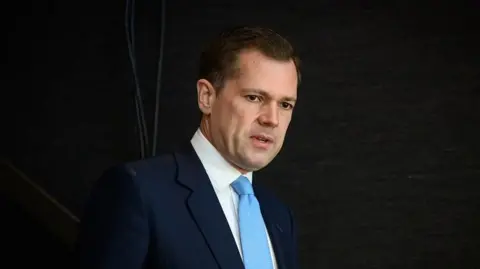In the political arena, maintaining a united front is often crucial to a party’s success. This sentiment was at the forefront when Kemi Badenoch, the leader of the Conservative Party, addressed allegations of a rift with Robert Jenrick, the shadow justice secretary. Recent comments by Jenrick regarding a potential partnership with Reform UK sparked a wave of controversy that led to intense scrutiny from both opposition parties and within the Conservative ranks.
Badenoch has consistently opposed any electoral pact with Reform UK, the party led by Nigel Farage, asserting that such a collaboration would undermine the Conservative Party. In a recent leaked recording disclosed by Sky News, Jenrick expressed a desire for a “united” front in the upcoming election against Labour, emphasizing his determination to “bring this coalition together.” This was perceived as a direct contradiction to Badenoch’s clear stance against any collaboration with Reform UK.
The ramifications of Jenrick’s commentary were swiftly capitalized upon by the Labour Party and the Liberal Democrats, who urged Badenoch to consider corrective measures such as dismissing Jenrick from his position on the Tory frontbench for his apparent divergence from the party line. Nevertheless, a spokesperson for Badenoch asserted that there were no significant differences in opinion between the party leader and Jenrick, attempting to quell any narratives of division within the party’s hierarchy.
In a statement to the press, the spokesperson reiterated Badenoch’s unequivocal stance on Reform UK, stating, “Kemi Badenoch has made perfectly clear there will be absolutely no electoral pact with Reform.” The spokesperson further expounded on Jenrick’s comments, suggesting that his remarks indicated a commitment to defeating Reform, rather than forming a coalition with them. The spokesperson also addressed speculation regarding Jenrick’s role within the party, confidently stating that he is indeed a “team player” within the shadow cabinet.
Despite the mounting pressure, Badenoch’s team argued that she was unaware of Jenrick’s comments at the time they were made, adding that the right-wing faction within the party was currently disunited. The spokesperson emphasized the need for the Tories to regain the trust of voters who have shifted towards Reform UK, admitting that the current political landscape poses challenges.
The conversation intensified during a recent session of Prime Minister’s Questions, in which Badenoch challenged Labour leader Sir Keir Starmer on his hesitation to address issues surrounding transgender policies, accusing him of lacking the requisite courage. In a harsh retort, Prime Minister Rishi Sunak disparaged Jenrick’s absence from the discussion, labeling it a retreat to “plotting” and presuming that he and Farage would be left competing for the remnants of the Tory Party.
As the situation developed, Jenrick’s remarks continued to serve as a focal point, particularly a recording from March in which he articulated concerns about the potential fragmentation of the Conservative vote leading to Labour’s success. As Jenrick stated, “You head towards a general election, where the nightmare scenario is that Keir Starmer sails in through the middle as a result of the two parties being disunited.” His clear desire for unity reflected a recognition of the party’s vulnerabilities in light of dwindling support.
Accompanying this internal party discourse, sources close to Jenrick have clarified his position. They emphasized that he seeks to re-establish the Conservatives as the primary choice for right-leaning voters while also admitting the difficulty of this task. In light of these developments, it becomes evident that both Badenoch and Jenrick, despite differing views on the necessity for collaboration, ultimately share a common goal: to solidify their party’s standing ahead of the next general election.
This ongoing internal dynamic within the Conservative Party signals a notable period of transition, where the rumblings of rifts and patches of unity will likely shape their electoral strategy moving forward. The interplay between leaders, party members, and public perception will remain critical as the party navigates its path in the politically charged climate of the UK.



